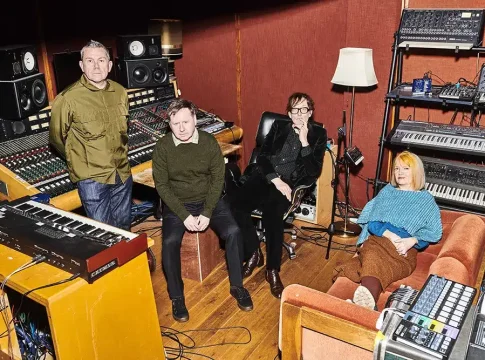Pulp’s Comeback with More: A Hit or a Miss?
Pulp, the iconic Britpop band known for anthems like “Disco 2000,” has swept back onto the scene with their first album in over twenty years, More. Instead of chasing trends or desperately trying to sound youthful, they’ve embraced a more mature perspective—akin to John Lennon’s reflective Double Fantasy. But will fans feel satisfied, or is this a nostalgic trip that doesn’t quite deliver?
Capturing the Essence of More
Pulp’s unique Englishness shines through every track, painting delightful scenes of summer festivals, local grocery shops, and the cherished mundane. Take “Spike Island,” an homage to a festival experience drenched in vibe but missing the punch fans have come to love. The overall sound, particularly in songs like “Partial Eclipse,” conveys a more tender side of Jarvis Cocker and the band, reminiscent of Roy Wood’s style.
However, it’s not all smooth sailing. Tracks like “Hymn of the North” overwhelm with orchestration, echoing the grandiose sound of Phil Spector but ultimately veering into theatrical territory. And let’s not even mention “My Sex,” a cringeworthy attempt at rap that puts even Paul McCartney’s cheeky “Fuh You” in a more flattering light.
A Shadowy Absence
One cannot discuss More without acknowledging the late bassist Steve Mackey. His signature punchy style is sorely missed; Andrew McKinney does his best, but the emotional weight just doesn’t feel quite as heavy. In “Spike Island,” Cocker digs deep for a cathartic howl that hints at the band’s struggle to fill the void left by Mackey’s absence.
Yet, there are standout moments. “Tina” feels like it could have comfortably sat alongside This Is Hardcore, weaving Pulp’s classic elements: soaring choruses, quirky lyrics, and a playful vibe. Cocker croons, “There is no alternative, I’ve got to live,” all while tackling the absurdity of shopping in a charity store.
A Mixed Bag of Tunes
Mark Weber sprinkles delightful hooks in “Grown Ups,” offering a lightweight but enjoyable introspective journey. Meanwhile, “Slow Jam” showcases Cocker’s soulful side, transforming into an unforgettable piano piece that ebbs and flows with energetic drumming from Nick Banks.
Despite these highlights, More can’t escape the shadow of Pulp’s stellar discography. Compared with the rawness of His ’N’ Hers or the poetic beauty of We Love Life, it falls somewhat flat. Even the polished production of Different Class can’t quite compete with the emotional depth from previous works.
A Hesitant Conclusion
As the album winds down with the last track, “A Sunset,” listeners are left feeling a bit deflated. It’s a charming folk tune that seems to lose steam towards the end, closing with a question mark. Should it end here? Thankfully, Pulp has brought back some magic, but one can’t help but feel a sense of uncertainty that mirrors Cocker’s own feelings.
In the end, More is quintessentially Pulp: a vibrant blend of nostalgia mixed with a dash of uncertainty. It’s not a complete triumph, but there’s enough charm to keep long-time fans hooked. Will we see more from them in the future? For now, it’s a gentle maybe as we begin to process this multifaceted return.

Covers viral stories, pop culture, and breaking celebrity news.
Bio: Jamie has a sharp eye for what’s buzzing online, tracking social media trends and entertainment headlines around the clock.

